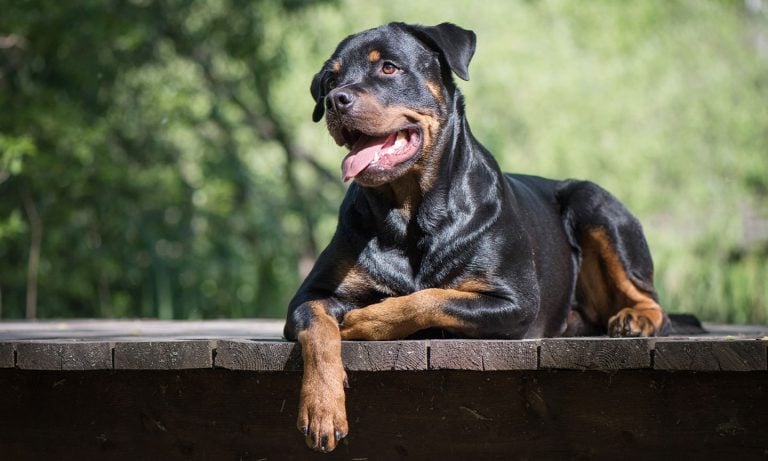Rottweiler vs Bullmastiff

Breed Snapshot
Best For
A popular working breed, Rottweilers do best with experienced pet parents who can provide early training and socialization. These robust, large-sized dogs thrive in homes with active individuals or families, appreciating both mental and physical...
A popular working breed, Rottweilers do best with experienced pet parents who can provide early training and socialization. These robust, large-sized dogs thrive in homes with active individuals or families, appreciating both mental and physical challenges.
Rottweiler Temperament
Rottweilers are powerful and intelligent dogs who benefit from early training and socialization. They are easy to train and eager to please their families, but are also strong-willed and may seem aloof to the outside world. Originally descending from the mastiffs of the Roman legions, Rottweilers have been valuable...
Rottweilers are powerful and intelligent dogs who benefit from early training and socialization. They are easy to train and eager to please their families, but are also strong-willed and may seem aloof to the outside world.
Originally descending from the mastiffs of the Roman legions, Rottweilers have been valuable companion animals and working dogs for centuries. This is just as true today as it was years ago—families that are willing to put in the time to train and socialize their Rottweiler will be rewarded with an intensely loyal and energetic dog.
In fact, Rottweilers are much more emotionally needy than many people assume. This dog has a fearsome reputation, but in reality, Rottweilers are obsessed with their people and want to be around them all the time. Rottweilers who are isolated from people or kept alone may begin to exhibit unwanted behaviors when they do finally get access to people.
Rottweilers were originally bred to be protectors. Combined with their great strength, this makes it especially important that Rottweilers are properly trained and socialized. Once socialized, Rottweilers can easily get along with other dogs and young children. Like any dog, Rottweilers who are poorly trained, subjected to harsh discipline, or isolated are more likely to exhibit unwanted fear-based behaviors, including biting and aggression.
One especially interesting features of these dogs is their vocalization. Rottweilers aren’t known for excessive barking (although of course they can and will bark), but they do have a deep rumble that sounds almost like a growl. Some pet parents think of this rumbling sound as “talking.” This “Rottie rumbling” is almost like the purring of a giant cat and often means your Rottweiler is happy and content, particularly during belly rubs.
Rottweiler Traits

Breed Snapshot
Best For
Bullmastiffs, powerful and loyal, thrive on consistent training with their favorite person: you. These devoted and gentle giants are ideal for pet parents with plenty of space and time for training—and plenty of love...
Bullmastiffs, powerful and loyal, thrive on consistent training with their favorite person: you. These devoted and gentle giants are ideal for pet parents with plenty of space and time for training—and plenty of love to give.
Bullmastiff Temperament
Bullmastiffs are affectionate, happy-go-lucky dogs who form deep bonds with their humans and are faithful companions. A cross between the easy-going Old English Mastiff and the courageous Bulldog, the Bullmastiff dog is the perfect combination of their traits. This big softie isn’t much of a barker. They were bred to spot, trac...
Bullmastiffs are affectionate, happy-go-lucky dogs who form deep bonds with their humans and are faithful companions. A cross between the easy-going Old English Mastiff and the courageous Bulldog, the Bullmastiff dog is the perfect combination of their traits.
This big softie isn’t much of a barker. They were bred to spot, track and pin down poachers, and they had to be silent to achieve this mission—truly, they are the ninjas of the dog world. You wouldn’t know they were around, except they’re usually leaning against your leg or trying to fold themselves into your lap. (Wherever you are is their favorite place to be.) And don’t even think of leaving them outside on their own. They’ll be at the back door waiting for you to let them in.
Bullmastiffs are not really aggressive, nor are they known for biting (even though they have a powerful bite force). Like most working breeds, they are confident and self-assured, but can be wary of strangers. So, start training your Bullmastiff puppy early to help get them used to having visitors in your home.
Because they are large dogs who often think they are toy-sized, they can be a bit clumsy around small children, cats and smaller dogs. So, be sure to keep an eye out when your Bullmastiff dog is around anyone smaller than them, and teach children how to interact responsibly with dogs.




